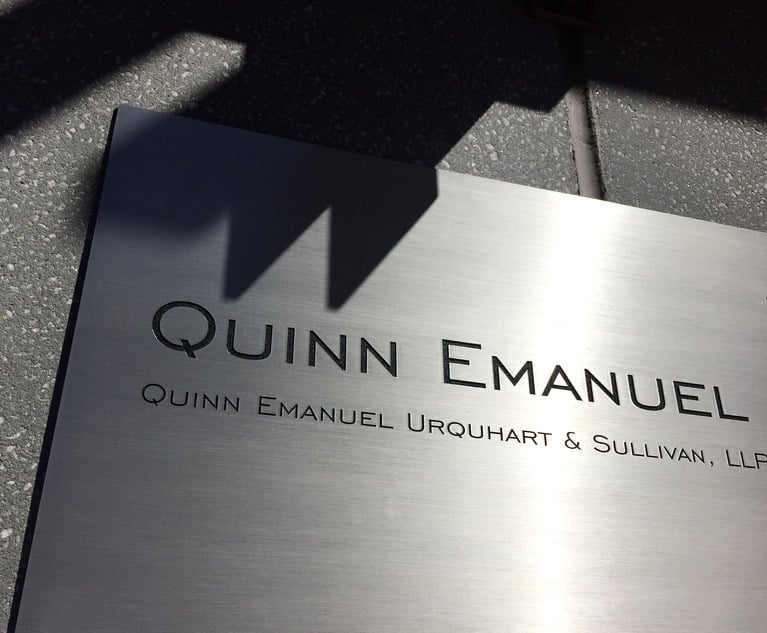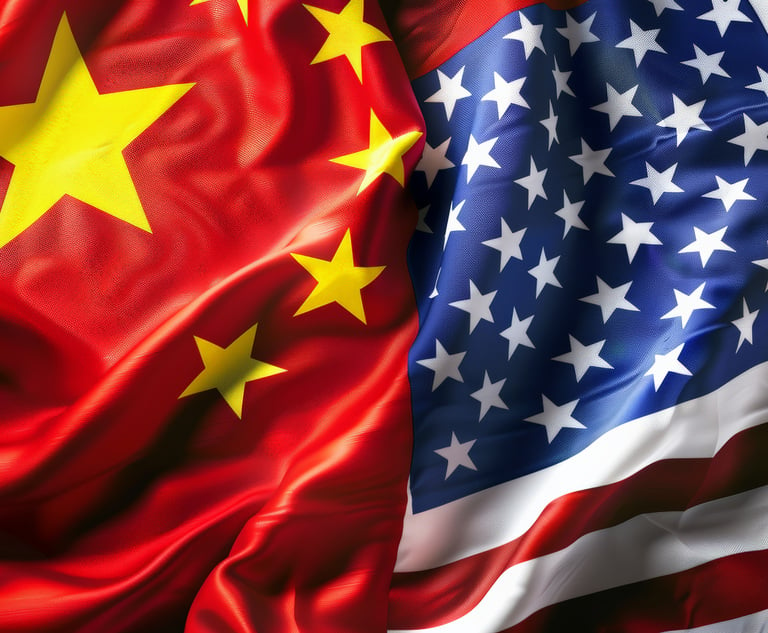Global Vereins Continued to Grow in 2018
All five full-service vereins tracked in the Am Law 100 showed positive revenue growth in 2018, paced by Baker McKenzie.
March 19, 2019 at 05:00 AM
7 minute read
The original version of this story was published on The American Lawyer
 Shutterstock.com
Shutterstock.com
The five full-service law firms in the Am Law 100 structured as Swiss vereins all grew their revenues in 2018, while also increasing their profitability.
While there is a threefold difference in size from Baker McKenzie to Squire Patton Boggs, the two firms – along with Hogan Lovells, DLA Piper and Norton Rose Fulbright – all employ the same basic legal structure for integrating their operations around the globe.
Within this small grouping, financial performance was rosy, according to data collected for The American Lawyer's upcoming Am Law 100 rankings. While none of the firms came close to matching Norton Rose Fulbright's 16 percent revenue growth in 2017, they were all clustered around the industry average for 2018, calculated by Citi Private Bank Law Firm Group.
The two largest firms in the category, Baker McKenzie and DLA Piper, both slightly outperformed the 6.4 percent average growth in revenue from Citi's sample of 191 firms. Baker McKenzie grew at 8.6 percent, bringing total revenues to $2.9 billion, while DLA Piper, growing at 7.7 percent, was just behind at $2.84 billion.
Meanwhile, the three smaller firms were not far behind. Hogan Lovells increased revenues by 4.1 percent to $2.12 billion, Squire Patton Boggs grew at 3.5 percent to $1.03 billion, and Norton Rose Fulbright grew at 0.5 percent to $1.97 billion. That comparatively low figure can be attributed to the challenge of building on the whopping 16.2 percent growth from the previous year.
 "Generally speaking, we're seeing the strongest performance among the firms with a stronger international footprint than domestic," said Gretta Rusanow, head of advisory services at Citi Private Bank.
"Generally speaking, we're seeing the strongest performance among the firms with a stronger international footprint than domestic," said Gretta Rusanow, head of advisory services at Citi Private Bank.
That partially explains why when Citi broke out the Am Law 50 firms from the rest of its sample, they performed better on average in 2018, collectively growing at 7.7 percent. The lion's share of the firms in that segment have an international presence, though none can match the reach of the largest vereins.
Compared to their Am Law 50 peers, Baker McKenzie was the sole verein whose growth exceeded their average. DLA Piper's growth rate matched the average, while the other three firms trailed.
Rusanow noted that productivity levels tend to be higher within the U.S. than outside of the U.S., while discounting pressures are higher internationally. Furthermore, the international collections cycle is longer.
"All of that can play into top-line growth," she said.
With regard to profitability, the five vereins' performance closely tracked the Citi sample, with Baker McKenzie's 11 percent profits per equity partner growth exceeding the Citi figure of 7.5 percent, which was essentially matched by Hogan Lovells' 7.6 percent growth. The three other firms increased profitability at rates ranging from 4.1 to 6.7 percent.
The Am Law 50 firms in Citi's sample, meanwhile, grew profits per equity partner by 8.4 percent on average.
Rusanow is optimistic about the prospects of these large global firms for 2019 and beyond, despite the challenges surrounding rates and productivity, pointing to the advantage of being able to go to market as a single unit to clients with operations spread around the globe.
"Having a global footprint serves as a driver of work back to the firm's U.S. offices, so that becomes very beneficial for the U.S. market," she added.
Below is a snapshot of the 2018 financial performance for each of the five vereins:
Baker McKenzie: Profits per equity partner increased 11 percent to $1.44 million as the equity partnership dipped by 22 partners to 680. The firm's revenue increased 8.6 percent to $2.9 billion. Revenue per lawyer increased 8.5 percent to $614,000, while the firm's total headcount remained steady. (See our previous report.)
DLA Piper: Revenues grew 7.7 percent to $2.84 billion, while profits per equity partner grew 6.7 percent to $1.87 million. Headcount rose 2.6 percent to 3,702 and revenue per lawyer climbed almost 5 percent to $766,000. The size of the equity partnership was steady. (See our previous report.)
Hogan Lovells: The firm's total global revenue grew 4 percent to $2.119 billion, while profits per equity partner climbed 7.6 percent to $1.38 million. Washington, D.C.-based CEO Steve Immelt said the firm was most focused on growing revenues per lawyer, a figure that rose 6 percent to $804,000. Headcount dropped 2 percent to 2,357, while the equity partnership contracted by 5.9 percent to 523. (See our previous report.)
Norton Rose Fulbright: Coming off a dynamic 2017, which the firm attributed to recent investments along with two combinations, revenue growth slowed to 0.6 percent, hitting $1.97 billion.
Energy transactional work was a driver in 2018, as the firm advised Canadian natural gas company Enbridge on its $1.12 billion sale of Midcoast Operating to a private equity firm, and advised Cabot on its $765 million sale of assets in the Eagle Ford shale play.
On the litigation side, the firm scored a major win on behalf of New Jersey Senator Robert Menendez, when the U.S. Department of Justice in January 2018 abandoned and moved to dismiss the corruption case against the Democrat politician. But that triumph was tempered when Menendez's lawyer – co-head of the firm's U.S. regulations, investigations, securities and compliance practice Abbe Lowell – left for Winston & Strawn in May, pointing to conflicts in the sprawling firm.
Headcount at the firm ticked upwards by 1.1 percent to 3,376, while the number of equity partners dropped by 4.6 percent to 681. Profits per equity partner grew by 5.5 percent to $907,000, while revenues per lawyer were steady at $583,000.
In 2018 additions, the firm rebuilt its cybersecurity practice with leaders from Holland & Knight and Shearman & Sterling. It also made a series of hires in Australia, including restocking its office in the capital Canberra.
Squire Patton Boggs: One year after the firm cracked the $1 billion mark, revenues continued to grow by 3.5 percent, hitting $1.03 billion. Profits per equity partner climbed 4.1 percent, crossing the $1 million threshold for the first time.
On the corporate side, the firm advised longtime client Ashland Global Holdings Inc, a speciality chemical company, in the $1.1 billion sale of its composites business to INEOS Enterprises, and also had a hand in two nine-figure deals in India.
The firm's disputes lawyers successfully defended the Republic of Kosovo against a €380 million ($430.7 million) investment treaty claim brought by a German private investor; and in the U.S., they beat back a $500 million antitrust class action over alleged price-fixing of ramen noodles.
Squire's total headcount (1,497) and number of equity partners (169) both did not budge in 2018. But the firm did open a new Atlanta office with three former Dentons partners and also acquired a Silicon Valley intellectual property boutique.
The firm also launched an international public policy practice in China, while adding two former U.S. congressmen and a top aide to House Speaker John Boehner – already with the firm – to its U.S. public policy shop.
Read More
This content has been archived. It is available through our partners, LexisNexis® and Bloomberg Law.
To view this content, please continue to their sites.
Not a Lexis Subscriber?
Subscribe Now
Not a Bloomberg Law Subscriber?
Subscribe Now
NOT FOR REPRINT
© 2025 ALM Global, LLC, All Rights Reserved. Request academic re-use from www.copyright.com. All other uses, submit a request to [email protected]. For more information visit Asset & Logo Licensing.
You Might Like
View All
X Ordered to Release Data by German Court Amid Election Interference Concerns

Quinn Emanuel's Hamburg Managing Partner and Four-Lawyer Team Jump to Willkie Farr

Trump ICC Sanctions Condemned as ‘Brazen Attack’ on International Law

U.S.- China Trade War: Lawyers Label WTO Dispute Pointless, Clients Have Their Hands Tied
Trending Stories
- 1States Accuse Trump of Thwarting Court's Funding Restoration Order
- 2Microsoft Becomes Latest Tech Company to Face Claims of Stealing Marketing Commissions From Influencers
- 3Coral Gables Attorney Busted for Stalking Lawyer
- 4Trump's DOJ Delays Releasing Jan. 6 FBI Agents List Under Consent Order
- 5Securities Report Says That 2024 Settlements Passed a Total of $5.2B
Who Got The Work
J. Brugh Lower of Gibbons has entered an appearance for industrial equipment supplier Devco Corporation in a pending trademark infringement lawsuit. The suit, accusing the defendant of selling knock-off Graco products, was filed Dec. 18 in New Jersey District Court by Rivkin Radler on behalf of Graco Inc. and Graco Minnesota. The case, assigned to U.S. District Judge Zahid N. Quraishi, is 3:24-cv-11294, Graco Inc. et al v. Devco Corporation.
Who Got The Work
Rebecca Maller-Stein and Kent A. Yalowitz of Arnold & Porter Kaye Scholer have entered their appearances for Hanaco Venture Capital and its executives, Lior Prosor and David Frankel, in a pending securities lawsuit. The action, filed on Dec. 24 in New York Southern District Court by Zell, Aron & Co. on behalf of Goldeneye Advisors, accuses the defendants of negligently and fraudulently managing the plaintiff's $1 million investment. The case, assigned to U.S. District Judge Vernon S. Broderick, is 1:24-cv-09918, Goldeneye Advisors, LLC v. Hanaco Venture Capital, Ltd. et al.
Who Got The Work
Attorneys from A&O Shearman has stepped in as defense counsel for Toronto-Dominion Bank and other defendants in a pending securities class action. The suit, filed Dec. 11 in New York Southern District Court by Bleichmar Fonti & Auld, accuses the defendants of concealing the bank's 'pervasive' deficiencies in regards to its compliance with the Bank Secrecy Act and the quality of its anti-money laundering controls. The case, assigned to U.S. District Judge Arun Subramanian, is 1:24-cv-09445, Gonzalez v. The Toronto-Dominion Bank et al.
Who Got The Work
Crown Castle International, a Pennsylvania company providing shared communications infrastructure, has turned to Luke D. Wolf of Gordon Rees Scully Mansukhani to fend off a pending breach-of-contract lawsuit. The court action, filed Nov. 25 in Michigan Eastern District Court by Hooper Hathaway PC on behalf of The Town Residences LLC, accuses Crown Castle of failing to transfer approximately $30,000 in utility payments from T-Mobile in breach of a roof-top lease and assignment agreement. The case, assigned to U.S. District Judge Susan K. Declercq, is 2:24-cv-13131, The Town Residences LLC v. T-Mobile US, Inc. et al.
Who Got The Work
Wilfred P. Coronato and Daniel M. Schwartz of McCarter & English have stepped in as defense counsel to Electrolux Home Products Inc. in a pending product liability lawsuit. The court action, filed Nov. 26 in New York Eastern District Court by Poulos Lopiccolo PC and Nagel Rice LLP on behalf of David Stern, alleges that the defendant's refrigerators’ drawers and shelving repeatedly break and fall apart within months after purchase. The case, assigned to U.S. District Judge Joan M. Azrack, is 2:24-cv-08204, Stern v. Electrolux Home Products, Inc.
Featured Firms
Law Offices of Gary Martin Hays & Associates, P.C.
(470) 294-1674
Law Offices of Mark E. Salomone
(857) 444-6468
Smith & Hassler
(713) 739-1250








